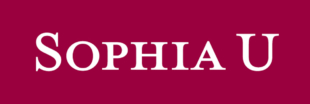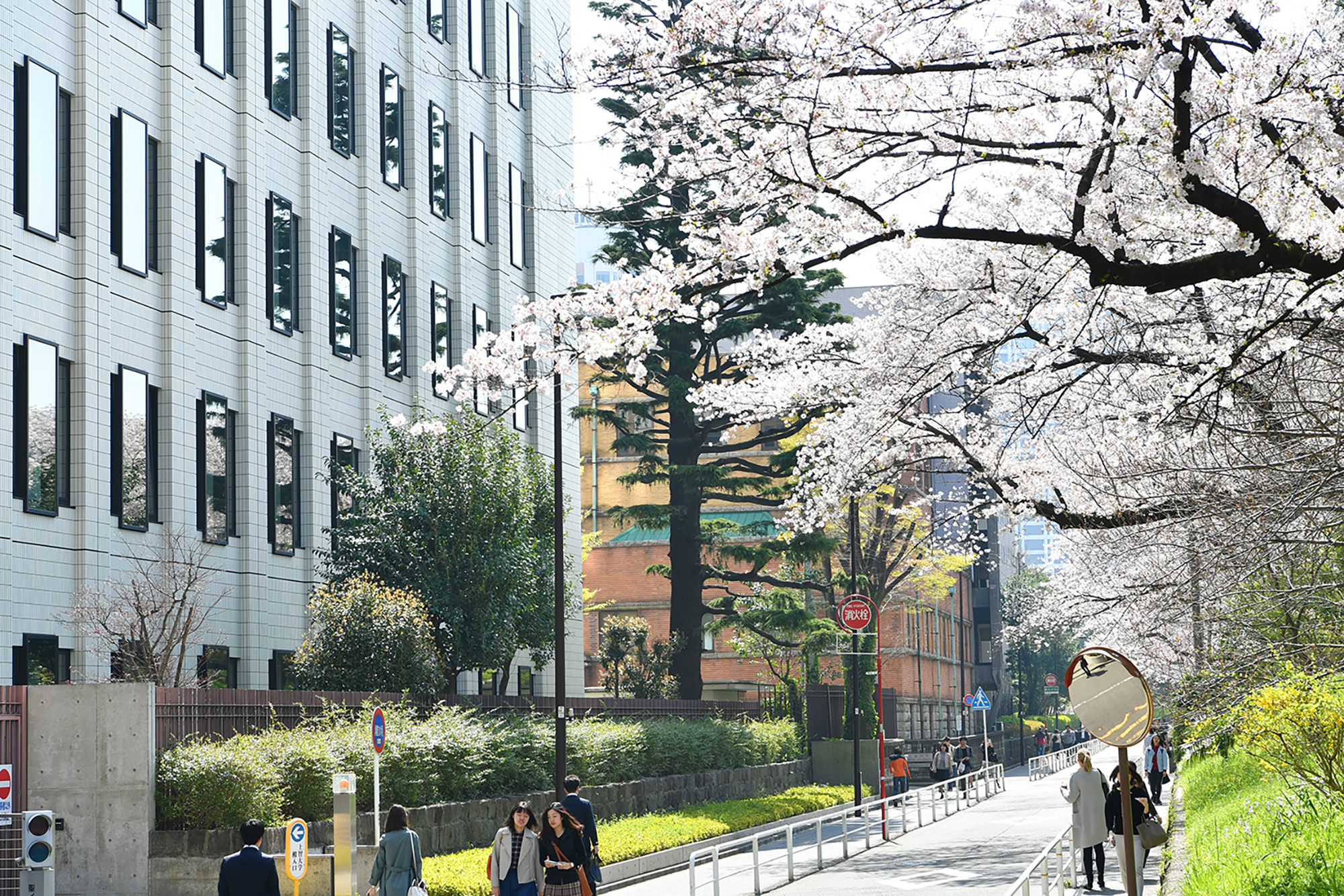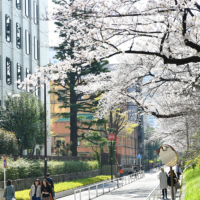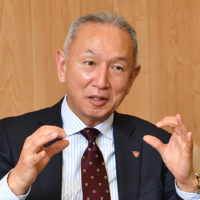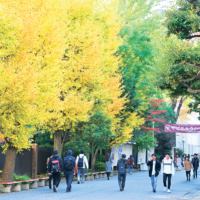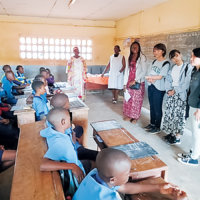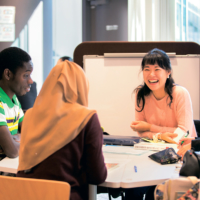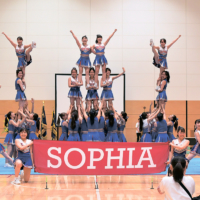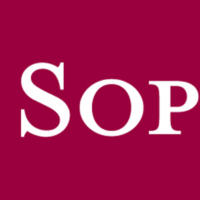Since its founding, Sophia University has nurtured graduates who bridge cultural, linguistic, generational and academic divides within its global campus environment. It boasts a campus that offers a global educational environment and a wide range of opportunities to study abroad. The university refers to this unique environment as the Global One Campus. The university’s Yotsuya Campus serves as a hub for all nine faculties and 29 departments, 10 graduate schools and 27 research institutions, spanning both liberal arts and the sciences, creating a vibrant and diverse academic community.
The campus currently attracts international students from over 90 countries, fostering a rich tapestry of cultures, languages and perspectives. It serves as a microcosm of the international community, providing students with an immersive experience that prepares them for the challenges and opportunities of an increasingly interconnected world.
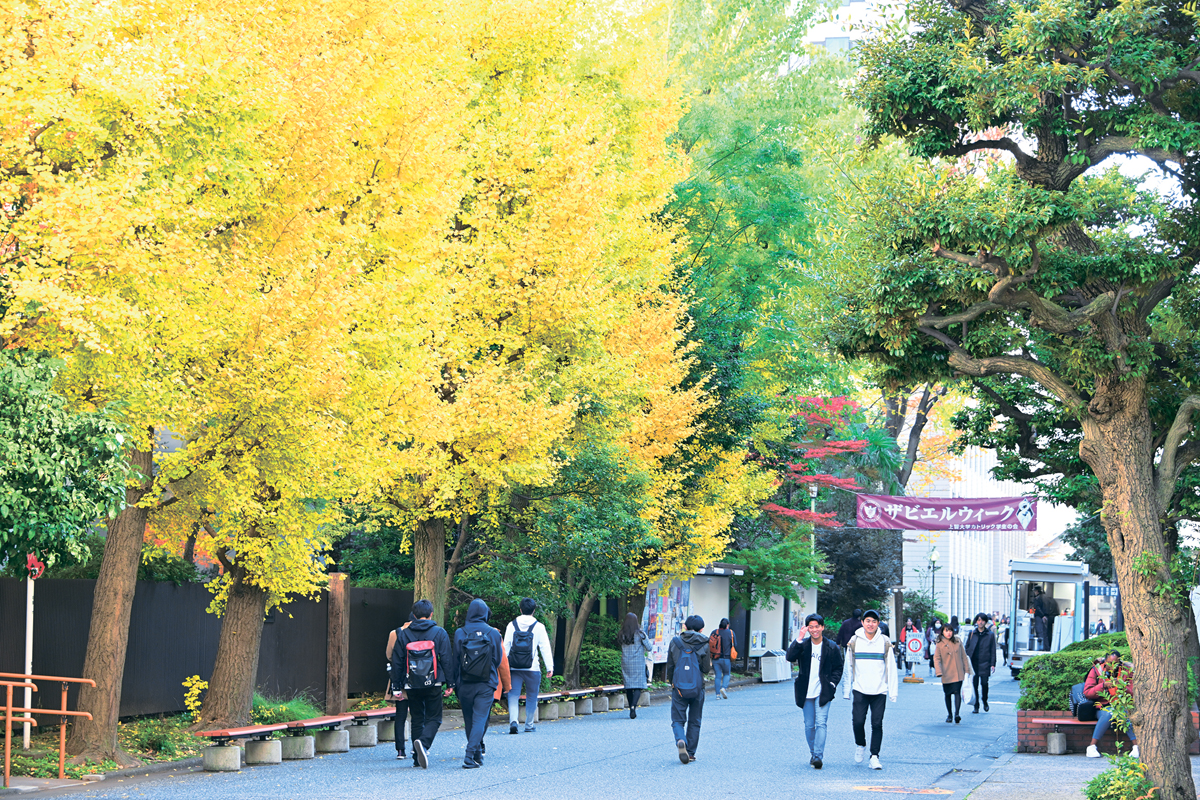
Sophia University, situated in the heart of Tokyo, is a renowned Catholic university with a rich history. The name “Sophia” is derived from the Greek word meaning wisdom or knowledge. The name reflects the university’s commitment to providing students with the highest wisdom to elevate them into desirable individuals.
Within this esteemed institution, students from diverse areas of study — including the humanities, human sciences, social sciences, natural sciences and engineering — all come together in pursuit of this highest wisdom. The university boasts an international campus where students engage with global issues and work toward fostering mutual understanding across cultural and religious boundaries. Through their studies and interactions, students strive to become well-rounded individuals equipped with the knowledge and skills necessary to make a positive impact on the world.
Sophia University, founded in 1913 as a Catholic Jesuit institution, has steadily evolved into a world-class university rooted in the Catholic educational tradition. Guided by its educational spirit of “For Others, With Others,” the university is dedicated to nurturing individuals who possess a strong sense of service to others and society as a whole.
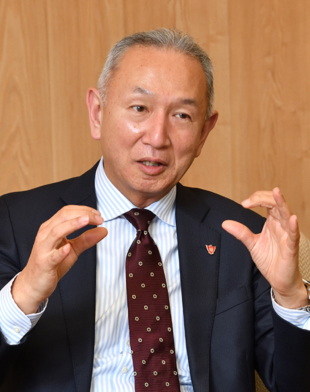
“The core philosophy of Sophia University’s education has remained steadfast since its founding,” said Yoshiaki Terumichi, president of Sophia University. “It is crucial for us to articulate the university’s philosophy in a manner that resonates with each generation and to thoughtfully integrate it into our academic programs.” He emphasizes the importance of staying true to the university’s foundational values while adapting their expression and implementation to the needs and challenges of the contemporary world.
Since its establishment, Sophia University has cultivated an educational approach rooted in Christian humanism that transcends national, linguistic and academic boundaries. The concept of Christian humanism is based on the belief that utilizing one’s talents and knowledge for the benefit of others will lead to personal growth and development.
“The term ‘others’ in our educational spirit refers to those who find themselves in challenging circumstances and require our support and understanding,” Terumichi said. “To embody this spirit, Sophia University strives to cultivate ‘servant leaders.’ The concept of leadership, in this context, extends beyond the traditional notion of corporate or organizational leadership. Our aim is to nurture leaders who possess the empathy, compassion and awareness necessary to recognize and attend to the needs of those who are in vulnerable positions within society.” The university is dedicated to cultivating human resources who embody the spirit of service and compassion, working toward the betterment of society and creating a sustainable future.
Diverse campus, global vision
Terumichi emphasized the important role that universities play in laying the foundation for students’ lifelong learning and personal development. “In terms of the school system, the university is the last place for formal education. Considering the fact that students continue to learn and grow after graduation in today’s society, we believe that the four years spent at the university are pivotal in building a strong foundation for their future,” he said.
“When we envision the ideal environment for building a solid foundation, we need a diverse campus — a campus that serves as a microcosm of the world,” he said. “That’s precisely what we have here at Sophia University’s Yotsuya Campus, which we call the Global One Campus.”
Understanding language and culture is essential to addressing global issues. Terumichi highlighted the significance of language learning in the context of understanding different cultures and global issues. “It is not merely a matter of knowing or speaking more than one language; the use of a language leads to an understanding of the culture itself, which is tied to that language,” he said. “It is essential to have an environment where you can contemplate ideas and exchange your perspectives with others within the context of diverse global outlooks and value systems.” He emphasized the importance of the university’s Global One Campus environment, where students are immersed in a diverse array of languages and cultures.
By bringing together students from diverse backgrounds, each with their unique specialties, native language and cultural heritage, Sophia University creates an environment that encourages cross-cultural understanding, collaboration and personal growth.
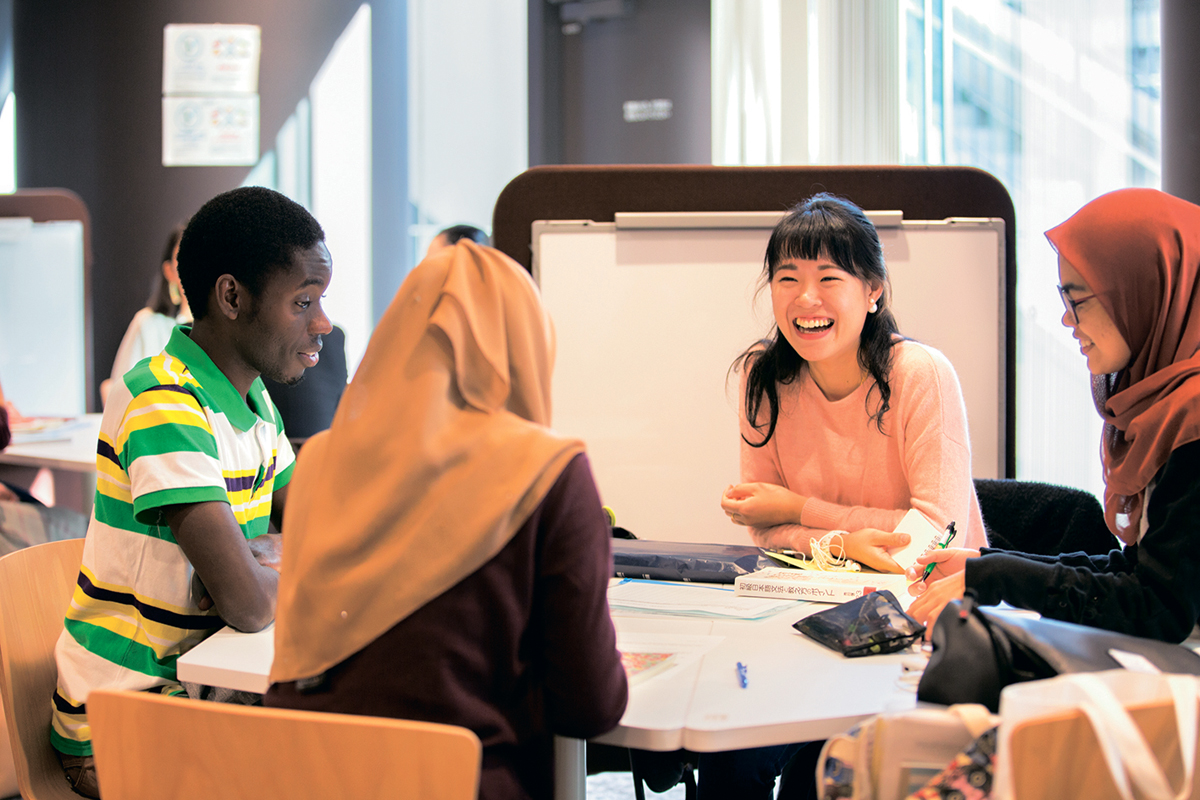
The term “Global One Campus” also carries another meaning: It signifies that Sophia University provides its students with opportunities to study in various locations around the world. In addition to the diverse and inclusive learning environment on its Yotsuya Campus, the university offers its students the opportunity to pursue their studies in numerous locations worldwide. It has established partnerships with more than 400 universities across the world, enabling students to undertake their studies in over 330 universities in virtually every corner of the globe except Antarctica.
Moreover, the university’s collaboration with international organizations further enhances the global learning experience for its students. These partnerships allow students to interact with professionals from diverse fields and backgrounds, providing them with unique insights into the workings of the international community. Through internships and other professional development opportunities, students can apply their knowledge and skills in real-world settings, contributing to the work of these organizations while gaining valuable practical experience.
The concept of a global campus extends beyond just having partnerships around the world and opportunities to study abroad. It also involves collaborating with international organizations, which allows students to interact with professionals operating in truly global arenas. Establishing worldwide partners is crucial for providing this well-rounded global experience.
“At Sophia, students can study abroad at partner universities, engaging with peers from diverse backgrounds. If they reach out, students can also intern at international organizations, working alongside seasoned professionals and gaining firsthand exposure to how global issues are tackled. This enables students to not only share their perspectives but learn from the professional approaches taken by those on the front lines,” Terumichi said. “We have multiple avenues in place for facilitating these types of immersive, multinational encounters and learning opportunities.”
As part of its efforts to provide global opportunities, Sophia University has signed an agreement on cooperation with the Inter-American Development Bank, headquartered in Washington, D.C. The IDB is an international development finance institution established in 1959, dedicated to promoting economic and social development in Latin America and the Caribbean. This collaboration has deepened through the organization of symposiums and seminars as well as the hosting of internships at the IDB’s Asia Office. Additionally, internships at the IDB headquarters, agreed upon this year, provide students with valuable opportunities to explore potential careers in international organizations.
Fostering a global perspective
Sophia University aims to deepen understanding among its diverse student body beyond language barriers. It strives to cultivate individuals who combine expertise with an appreciation for diversity and practical skills.
The Global One Campus serves as a hub for students from diverse backgrounds to come together and deepen their understanding of one another, transcending language barriers and cultural differences.
Sophia University’s English-taught programs are created to foster a diverse and inclusive learning environment. Offered across six of the university’s nine faculties, these programs bring together students from various countries and cultural backgrounds, creating a truly multinational educational experience.
The programs not only attract top-tier international students but also encourage Japanese students to pursue their studies in English. This approach promotes cross-cultural understanding and collaboration as students from different backgrounds learn alongside one another and engage in meaningful exchanges.
Terumichi said: “Language serves as a crucial tool for mutual understanding. By pursuing their degrees in English, students can delve deeper into one another’s personalities, values and perspectives, moving beyond the confines of language barriers. This immersive experience allows students to appreciate the diversity of thought and approach that stems from their varied cultural backgrounds. Through the experience of communicating with people from different parts of the world and sharing their opinions, students acquire a global perspective and practical skills.”
Collaboration in Africa
Sophia University’s commitment to providing its students with global learning opportunities extends far beyond the boundaries of its Tokyo campuses. Terumichi said, “The university actively seeks to create avenues for its students to immerse themselves in diverse cultures and gain valuable experiences worldwide.” One such region that Sophia University has focused on is Africa.
The university recognizes the growing importance of the African region in the global economy and the need to prepare its students for the opportunities and challenges that this dynamic region presents. With Africa experiencing rapid economic growth and being viewed as the “last market,” the university has taken proactive steps to provide its students with meaningful opportunities to engage with and develop their perspectives on the African region.
One notable initiative is the short-term social engagement program that Sophia University offers to all undergraduate students twice a year. This program is designed to give students hands-on experience and exposure to the diverse cultures, economies and societies of African countries. By participating in these programs, students gain valuable insights into the unique dynamics of the region and develop a deeper understanding of the role they can play in shaping its future.
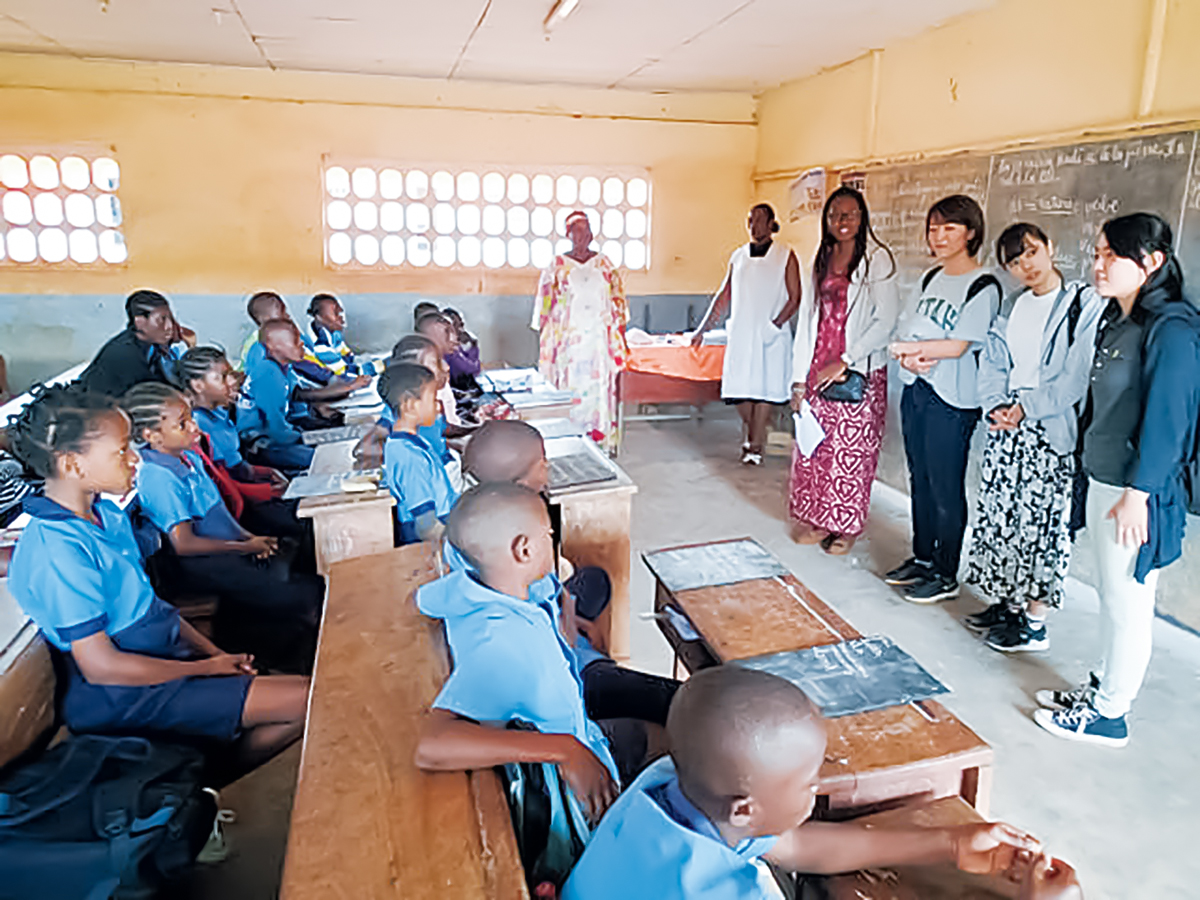
By offering a range of activities and opportunities for engagement, the university aims to equip its students with the knowledge, skills and perspectives necessary to navigate and contribute to the dynamic changes taking place in the region. While the main destinations of the program have been Cote d’Ivoire, Cameroon and South Africa, the university has also sent students to other countries such as the Benin in the past.
The program aims to immerse students in African countries for about two weeks, allowing them to learn about the present situation in Africa, where the social economy is undergoing significant changes. Participants achieve this through attending lectures at local universities, visiting international cooperation organizations, such as the African Development Bank (AfDB), and engaging in civic activities deeply connected to the local community.
“Through collaborations with universities and international organizations in these African regions, students gain valuable opportunities to learn about present-day Africa and witness firsthand the efforts being made to support vulnerable populations and tackle global issues,” Terumichi said.
Sweden-Japan MIRAI project
Sophia University is also actively engaged in a further initiative known as MIRAI, a research collaboration jointly conducted by Swedish and Japanese universities. This joint initiative aims to contribute to long-term research collaboration and to promote Sweden and Japan as nations of world-leading large-scale research infrastructure.
The MIRAI project was launched in 2016. Following its success, numerous joint research projects and programs were initiated under the second phase, starting in 2020. The third-phase MIRAI project is set to commence in 2024, building upon the achievements of its predecessors. Sophia University has been a founding institutional member since its establishment and is currently engaged in a wide range of collaborative research endeavors.
Japan and Sweden share many similarities, despite the differences in their populations. Both nations boast robust technological capabilities, and the Japanese hold Swedish science and engineering universities in high regard for their exceptional standards. “The MIRAI project presents a unique opportunity for universities in both countries to advance collaborative partnerships and engage in joint research initiatives, capitalizing on their respective strengths,” Terumichi remarked.
The collaboration between Japan and Sweden, two nations with differences in populations, has thrived in their scientific and technological research communities and promises to be a significant endeavor that will foster mutual growth and development.
The MIRAI project serves as an excellent illustration of international collaborative research that harnesses the unique strengths of universities in both Japan and Sweden, contributing to the development of a global research network. By actively participating in this initiative, Sophia University will advance its partnerships with Swedish universities, thereby enhancing its research capabilities and expanding its international reach.
Global research network
Sophia University advances the internationalization of research activities by fostering research exchange and joint research among its researchers and graduate students through its research activity network with overseas universities. Its active membership in the Strategic Alliance of Catholic Research Universities (SACRU) represents one of its ongoing collaborative research efforts. SACRU is a global network of Catholic research universities established to foster research, education and worldwide collaboration in the spirit of the Catholic faith. At present, the alliance consists of eight member universities, with Sophia University representing Asia. The mission of SACRU is to foster global cooperation among the partners with the goal of advancing world-leading knowledge and higher education for the common good in this age of social transformation, technological disruption and environmental hazard. The alliance aims to achieve several objectives through a diverse range of global academic activities and initiatives. These goals include strengthening the connection between progress and reason in the digital age, enhancing research for trade, promoting global education, facilitating digital transformation, advancing student participation in education and research, and contributing to the wave of knowledge creation and technology transfer.
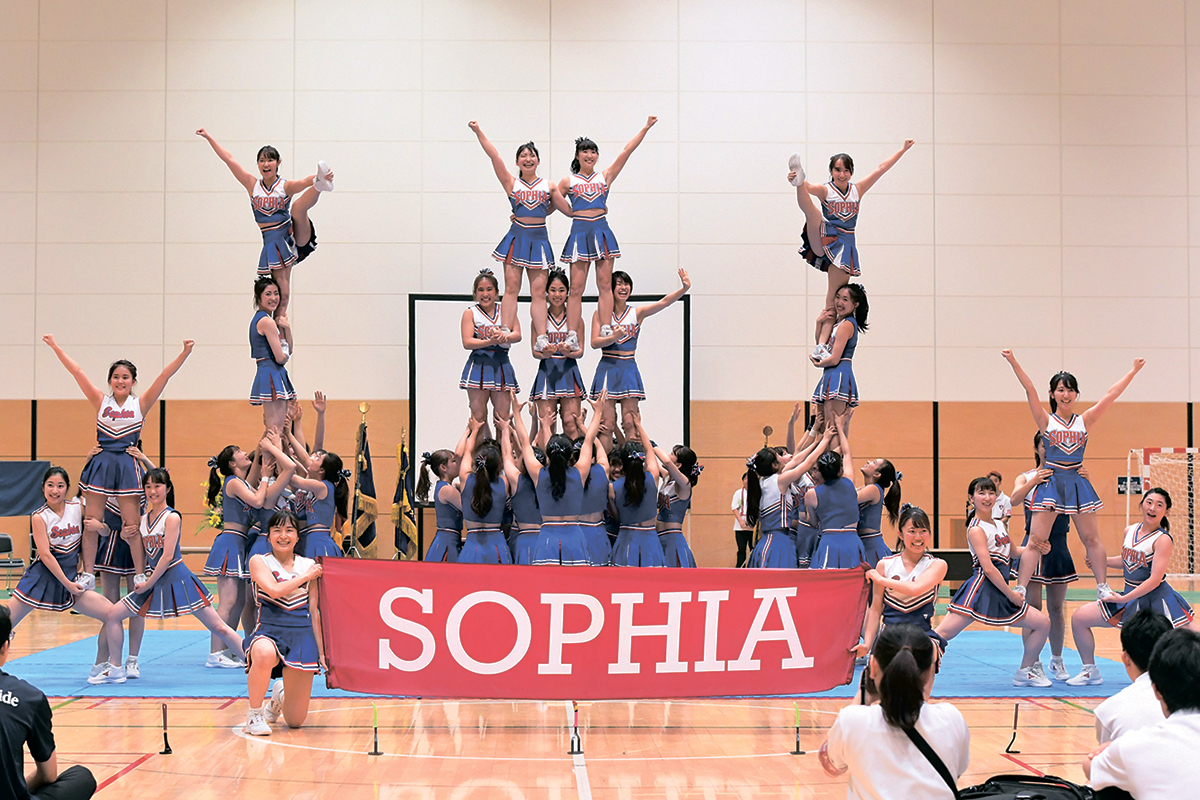
“For instance, the alliance occasionally focuses on themes that address papal encyclicals, such as environmental concerns, support for socially vulnerable populations and the importance of respecting diversity,” Terumichi said. “Researchers from each member university convene to present their research findings on a shared theme. The foundation of shared values of participating universities in the Catholic spirit provides a unified perspective on how to approach and explore research topics.”
Sophia University’s engagement extends beyond collaboration with Catholic universities, as it actively participates in the broader international university network to promote advanced research and create an enriched learning environment. This involvement includes its active role in the International Association of Universities.
The IAU is the most globally representative association of higher education institutions and their associations, founded under the auspices of UNESCO in 1950. It is a membership-based organization serving the global higher education community through trend and expertise analysis, publications and portals, advisory services, peer-to-peer learning, events and global advocacy.
From Nov. 22 to 24 this year, Sophia University will host the IAU 2024 International Conference. This event will provide a platform for participants to engage in discussions about the current state of higher education and other relevant global issues. Terumichi believes that engaging with various institutions of higher education will provide an opportunity for Sophia University to gain new insights and understanding, potentially leading to a fresh perspective on its own educational and research environment.
“I encourage students to embrace challenges throughout their time at Sophia University,” Terumichi said. He encourages students to push themselves to reach their full potential by embarking on three types of challenges. “First, they should pursue challenges that are within their grasp. Second, they should attempt a challenge that might seem unattainable. Finally, I want them to embrace an experience that they haven’t even considered yet. By engaging in a balanced mix of these three challenges, students will develop greater self-confidence. The experience gained from taking on challenges creates a person’s unique charm. That distinctive charm can prove invaluable in building trust with others.”
Within its diverse global environment, Sophia University continues to nurture students to build robust academic and personal foundations, shaping them into world-class “servant leaders.”
Page 14 and page 15 are sponsored by Sophia University
Sophia University
7-1 Kioi-cho, Chiyoda-ku, Tokyo 102-8554 Japan
https://www.sophia.ac.jp/eng/
[email protected]
